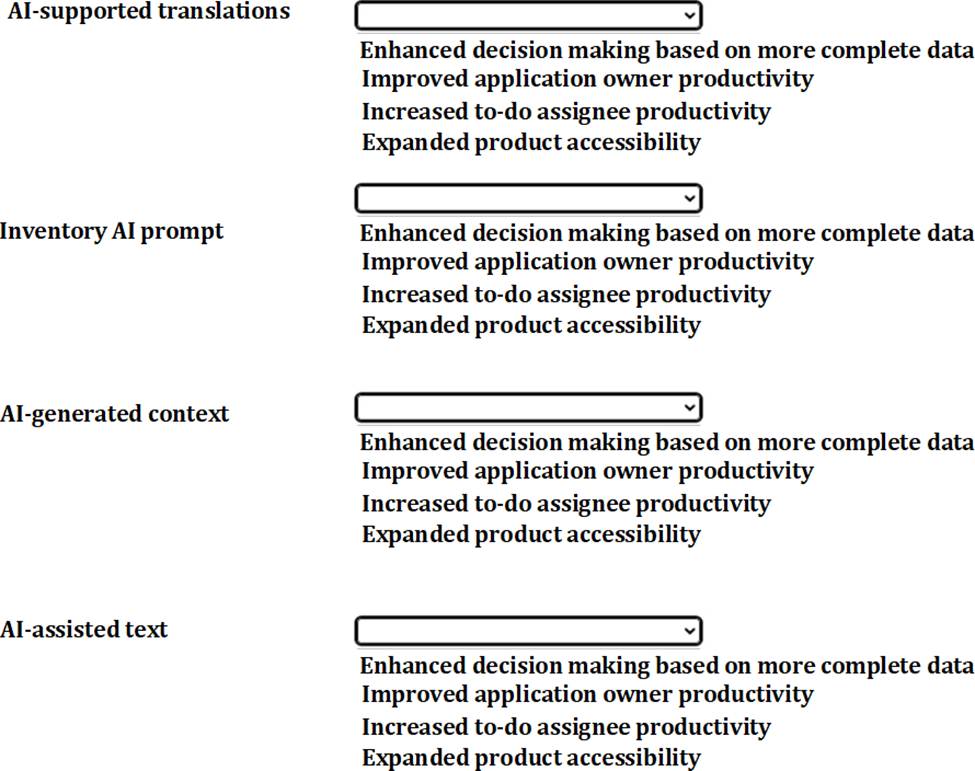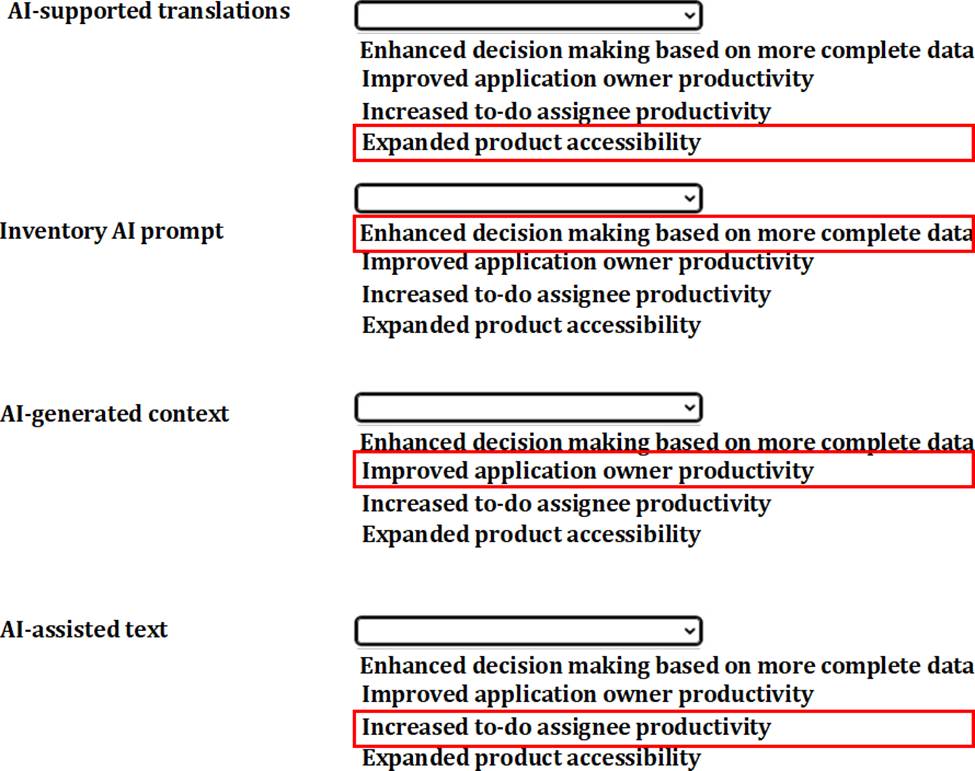Practice Free C_BCBAI_2509 Exam Online Questions
Which of the following capabilities are offered by Joule for Consultants? Note: There are 2 correct answers to this question.
- A . Project lifecycle support
- B . Code intelligence
- C . Process automation
- D . SAP Fiori apps smart help
A, D
Explanation:
Joule provides targeted capabilities for consultants to streamline their work within SAP ecosystems. Project lifecycle support enables consultants to manage project phases, from planning to execution, by providing AI-driven insights and recommendations, as outlined in the SAP Business AI documentation. SAP Fiori apps smart help enhances consultants’ ability to navigate and utilize Fiori apps efficiently, offering contextual guidance and support within the SAP environment. While code intelligence and process automation are valuable AI features, they are not specifically highlighted as consultant-focused capabilities in SAP’s Joule documentation. These features empower consultants to deliver high-value services by improving efficiency and accuracy in SAP-related tasks.
Reference: SAP Business AI Joule Consultant Guide, SAP Fiori Apps Documentation, 2025.
# SAP Business AI Questions (Batch 2 of 5)
Which of the following capabilities are offered by Joule for Consultants? Note: There are 2 correct answers to this question.
- A . Project lifecycle support
- B . Code intelligence
- C . Process automation
- D . SAP Fiori apps smart help
A, D
Explanation:
Joule provides targeted capabilities for consultants to streamline their work within SAP ecosystems. Project lifecycle support enables consultants to manage project phases, from planning to execution, by providing AI-driven insights and recommendations, as outlined in the SAP Business AI documentation. SAP Fiori apps smart help enhances consultants’ ability to navigate and utilize Fiori apps efficiently, offering contextual guidance and support within the SAP environment. While code intelligence and process automation are valuable AI features, they are not specifically highlighted as consultant-focused capabilities in SAP’s Joule documentation. These features empower consultants to deliver high-value services by improving efficiency and accuracy in SAP-related tasks.
Reference: SAP Business AI Joule Consultant Guide, SAP Fiori Apps Documentation, 2025.
# SAP Business AI Questions (Batch 2 of 5)
Which of the following capabilities are offered by Joule for Consultants? Note: There are 2 correct answers to this question.
- A . Project lifecycle support
- B . Code intelligence
- C . Process automation
- D . SAP Fiori apps smart help
A, D
Explanation:
Joule provides targeted capabilities for consultants to streamline their work within SAP ecosystems. Project lifecycle support enables consultants to manage project phases, from planning to execution, by providing AI-driven insights and recommendations, as outlined in the SAP Business AI documentation. SAP Fiori apps smart help enhances consultants’ ability to navigate and utilize Fiori apps efficiently, offering contextual guidance and support within the SAP environment. While code intelligence and process automation are valuable AI features, they are not specifically highlighted as consultant-focused capabilities in SAP’s Joule documentation. These features empower consultants to deliver high-value services by improving efficiency and accuracy in SAP-related tasks.
Reference: SAP Business AI Joule Consultant Guide, SAP Fiori Apps Documentation, 2025.
# SAP Business AI Questions (Batch 2 of 5)
What are some generative AI tools for an SAP Cloud ERP transformation? Note: There are 3 correct answers to this question.
- A . Process automation
- B . Extension builder wizard
- C . Integration generator
- D . Process model generator
- E . ABAP Business Object generator
A, D, E
Explanation:
Comprehensive and Detailed Explanation From Exact Extract: Generative AI tools for SAP Cloud ERP transformation include process automation capabilities in SAP Build Process Automation for generating and automating business processes, the process model generator in SAP Signavio for creating process models using AI, and the ABAP Business Object generator in Joule for developing ABAP-based business objects to extend ERP functionalities. These tools facilitate efficient migration, customization, and optimization during cloud ERP transformations by leveraging generative AI to streamline code, processes, and extensions.
Exact extracts supporting this:
Process automation: "SAP Build Process Automation integrates with generative AI to generate and edit business processes, decisions, forms, and script tasks using natural language descriptions."sap.com This supports automation in ERP transformations.
Process model generator: "SAP Signavio uses generative AI to assist in process modeling, recommending performance indicators and generating models based on best practices."learning.sap.com
ABAP Business Object generator: "Joule generates ABAP business objects using the ABAP RESTful Application Programming Model (RAP) for extensions in SAP S/4HANA Cloud."learning.sap.com "Generative AI in ABAP Cloud includes business object generation."community.sap.com
Other options are incorrect because:
Option B: While extension building is simplified with wizards in SAP Build Code, it is not specifically a "generative AI tool" but rather a guided process; generative aspects come from Joule integration.
Option C: Integration generation is supported in SAP BTP, but not highlighted as a distinct generative AI tool for ERP transformation; focus is on code and process generation.
Reference from Positioning SAP Business AI Solutions as part of SAP Business Suite documents or Study Guide: Derived from SAP Learning Journey "Boosting Your Cloud Transformation Journey with SAP Business AI and Generative AI," units on generative AI in SAP Signavio, Build Process Automation, and ABAP Cloud. Supported by SAP Community blogs on generative AI for S/4HANA migration and SAP Help Portal, aligning with C_BCBAI_2502 certification for tools in cloud ERP transformations.
What does business AI mean? Note: There are 3 correct answers to this question.
- A . Enterprise data
- B . Customer centricity
- C . Processes
- D . Agility
- E . Technology foundation
A, C, E
Explanation:
Comprehensive and Detailed Explanation From Exact Extract: Business AI in SAP is defined as the combination of technology foundation (the underlying AI technology), enterprise data (the business data it leverages), and processes (the business processes it enhances and automates). This holistic approach ensures AI is embedded in business contexts for relevant, reliable, and responsible outcomes, with customer centricity and agility as resulting benefits rather than core components.
Exact extracts supporting this:
"What does SAP Business AI mean? Essentially three things: The technology it is based on. The enterprise data it is trained on. The processes it runs through."learning.sap.com
Enterprise data: "Grounded in customers’ business data."learning.sap.com
Processes: "Embed AI features across all business processes, delivering immediate value to businesses."events.sap.com "Automating processes, and enabling predictive analytics."community.sap.com
Technology foundation: "The technology it is based on."learning.sap.com "These AI functionalities are designed to help businesses automate processes, gain insights from data, improve decision-making."community.sap.com
Other options are incorrect because:
Option B: Customer centricity is a benefit or principle in SAP solutions (e.g., in supply chain), but not a core definitional component of business AI.
Option D: Agility is an outcome enabled by business AI, such as increasing business agility, but not part of its fundamental definition.
Reference from Positioning SAP Business AI Solutions as part of SAP Business Suite documents or Study Guide: From the SAP Learning course "Discovering SAP Business AI," specifically the unit "Explaining the role of SAP Business AI," which defines business AI as the intersection of technology, data, and processes. Supported by SAP community blogs and product overviews, aligning with C_BCBAI_2502 certification for positioning AI in the SAP Business Suite.
HOTSPOT
Match the outcomes in the dropdown lists to the capabilities of Joule


Explanation:
Step-by-Step Solution
You are asking Joule to create a new purchase requisition.
Which interaction pattern does your request represent?
- A . Commercial
- B . Informational
- C . Transactional
- D . Financial
C
Explanation:
Creating a new purchase requisition with Joule represents a transactional interaction pattern. As per SAP Business AI documentation, transactional interactions involve executing specific business processes, such as creating, updating, or managing records within SAP systems. Joule’s ability to handle such tasks streamlines operations by automating workflows and reducing manual effort. Informational interactions focus on retrieving data, commercial and financial are not defined interaction patterns in SAP’s framework, and the act of creating a requisition is distinctly transactional. This capability enhances efficiency in procurement processes, allowing users to focus on strategic tasks while Joule manages operational activities seamlessly.
Reference: SAP Business AI Joule User Guide, SAP AI Foundation Overview, 2025.
You are asking Joule to create a new purchase requisition.
Which interaction pattern does your request represent?
- A . Commercial
- B . Informational
- C . Transactional
- D . Financial
C
Explanation:
Creating a new purchase requisition with Joule represents a transactional interaction pattern. As per SAP Business AI documentation, transactional interactions involve executing specific business processes, such as creating, updating, or managing records within SAP systems. Joule’s ability to handle such tasks streamlines operations by automating workflows and reducing manual effort. Informational interactions focus on retrieving data, commercial and financial are not defined interaction patterns in SAP’s framework, and the act of creating a requisition is distinctly transactional. This capability enhances efficiency in procurement processes, allowing users to focus on strategic tasks while Joule manages operational activities seamlessly.
Reference: SAP Business AI Joule User Guide, SAP AI Foundation Overview, 2025.
HOTSPOT
Match the benefit from the dropdown list to the SAP LeanIX Al capabilities.


Explanation:
Here is the correct matching for the benefits of each SAP LeanIX AI capability:
AI-supported translations
→ Expanded product accessibility
Inventory AI prompt
→ Enhanced decision making based on more complete data AI-generated context
→ Improved application owner productivity
AI-assisted text
→ Increased to-do assignee productivity
Which of the following are included in SAP’s Responsible AI framework? Note: There are 3 correct answers to this question.
- A . SAP Global Human Rights commitment
- B . Transparency and accountability
- C . ESG reporting
- D . Ethical governance
A, B, D
Explanation:
SAP’s Responsible AI framework includes the SAP Global Human Rights commitment, transparency and accountability, and ethical governance, as detailed in SAP documentation. The SAP Global Human Rights commitment ensures AI respects human rights, aligning with global standards. Transparency and accountability mandate clear documentation of AI processes and decision-making, fostering trust. Ethical governance establishes policies and oversight to ensure fairness, mitigate bias, and comply with regulations. ESG reporting, while part of SAP’s sustainability efforts, is not a core component of the Responsible AI framework, and human-centered design is a principle but not explicitly listed. These elements ensure SAP’s AI solutions are trustworthy and ethical.
Reference: SAP Responsible AI Framework, SAP Ethics Guide, 2025.
